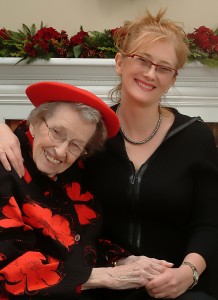Jo Maeder is the author of a memoir about the time she spent caring for her aging mother. It’s called When I Married My Mother: A Daughter’s Search for What Really Matters—and How She Found It Caring for Mama Jo. I recently read and reviewed When I Married My Mother, and I’ve been recommending it to everyone I know since. I really think lots of women will find Maeder’s story inspiring, and I asked if she could answer a few questions for readers at Mother Daughter Book Club.com. Here’s the interview.
You faced a lot of challenges in getting everything set up to take care of Mama Jo. What was one of the biggest?
JM: Looking back, the hardest part was dealing with my mother’s decline long distance and trying to figure out what to do. My mother was also a hoarder who refused to throw out one thing, let a stranger in to help, or relocate. She was in Richmond, VA, I was in the New York City area, and my brother was 4 hours from Mama Jo in Greensboro, NC. We relied on her neighbor and best friend a lot but there’s only so much they could do, or we could ask them to do. In the book I talk about how I convinced her to give me Power of Attorney and the ordeal of getting her moved to Greensboro—where I also moved. I called it Operation Mama Jo because it felt like a military maneuver. It took a Herculean effort by many to accomplish our mission. But it was so worth it!
Moving from a Manhattan lifestyle to a life in small town North Carolina must have been a huge change for you. What do you miss most about your old city life? What was a pleasant surprise about your new town?
JM: There’s so much I don’t miss about New York: the high cost of living, the swearing, the horrible winters, the ordeal of just parking your car. What I do miss are my friends and the socializing, and the unmistakable energy of the northeast in general and the city in particular. What surprised me the most about living in the South was how charmed I was by the people I met everywhere I went. There’s definitely an “Andy of Mayberry” undertone but there’s also a sophisticated vibrancy I didn’t expect.
How was your perception of what life would be like taking care of your mother different from the reality?
JM: It was completely different. She became the sweetest, funniest person and I smoothed out a lot of my rough edges, too. The things I thought would be a problem, like her hoarding, her anger, her inability to get anywhere on time, were not issues at all. Problems I never dreamed would come up—snakes, the giant jumping wolf spider, bats, septic coming up in the front yard—were the stressors.
There must have been many days you wondered whether changing your life to care for your mother was worth it. How did you get through those?
JM: I never doubted it. After three years, though, I did begin to wonder if I would still feel that way if she lived another ten years. It was extraordinarily fulfilling but all-consuming, too. Now I wish she had lived longer. I miss her so much. Our time together was some of the best years of my life. And we had pretty much gone our separate ways when I was 14. That was probably why it was so good. We had a lot of catching up to do.
Do you have any advice for others who are considering caring for an elderly parent?
JM: I know most people can’t do what I did – leave their present lives and move somewhere else to care for a parent while working from home. What’s important is that resentment doesn’t fester. If you can’t handle it, don’t feel guilty about it. You’ll have to make hard choices. You’re not alone. I have some specific eldercare tips on my site at: http://www.jomaeder.com/links/elderly
Is there anything else you would like to say to readers at Mother Daughter Book Club.com?
JM: One thing that became clear to me is that even if you have plenty of money in your old age to hire caregivers (which my mother did not), you still need someone you can trust to manage everything from doctor appointments to hair cuts to helping you stay in touch with your friends. All you can do is show kindness and compassion throughout your life and pray that it will come back to you.
The other point I’d like to make is how deeply I regret not getting over my Mother Issues a lot sooner. I know we both had to surrender to get to this wonderful place where we could love each other and enjoy each other’s company, but I still wish it hadn’t taken so long. I hope any Mother/Daughters reading When I Married My Mother will find that it opens up a dialog between them that perhaps they’ve been avoiding, from misunderstandings to the practical end-of-life issues. One young woman told me, “I had a great conversation with my mother after I read your book about her stuff—what she wants me to keep and what the stories are.” That made me smile. In the end, all we have are our stories. The time I had with Mama Jo gave me an amazing one.


